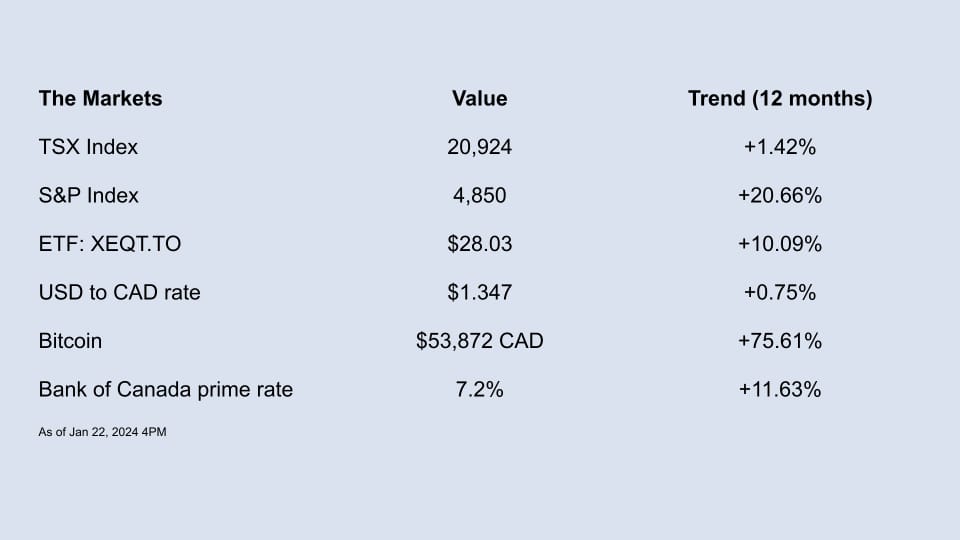Good morning! Postcall here, sparking more joy than this dog’s peanut butter.

Speaking of peanut butter… Happy National Peanut Butter Day! 🥜
❓Trivia question❓: What decade is considered the start of the peanut allergy epidemic? (Answer at the bottom of today’s issue!)
Now it’s time for this week’s stories!

Driving these numbers:
Last week, the S&P500 set a new record-high closing at 4,839, beating the previous record set in Jan. 2022. Over half of that growth comes from 7 tech stocks: Apple, Alphabet, Amazon, Microsoft, Meta, Nvidia, and Tesla.
In contrast, the TSX enjoyed more modest gains, with higher interest rates weighing down Canada’s real-estate-dependent economy. The Bank of Canada, in its first interest rate decision this year, is expected to leave its key overnight rate unchanged.
MIT's MRSA-velous Breakthrough🤩🌠
We’re digging into a quick bite from last week, because deep learning isn’t just for AI, people!
What happened: MIT's nailed using deep learning to find compounds that can tackle drug-resistant bacteria, especially MRSA, which caused 555 deaths in 62+ Canadian hospitals from 2015-2018. The study reveals these compounds not only eliminated MRSA in lab and mouse tests but also played nice with human cells. A serious antibiotic breakthrough might be underway.
MIT's brainiacs cracked open the deep learning model they used, opening its mysterious "black box.” Using a massive dataset of around 39,000 compounds, the algorithm pinpointed not just anti-MRSA molecules but specific substructures dealing real damage to the bacteria.
Why it’s important: MIT's study is part of their Antibiotics-AI Project, aiming for 7 new antibiotic classes to tackle the deadliest bacteria globally. Their open-box wisdom could cook up even better drugs than the model found.
Antibiotic resistance is the potential apocalypse that could wipe out 10 million annually by 2050. WHO called it a top 10 global health threat, the "silent pandemic" in 2019. Thanks to COVID-19’s party, the problem has worsened, with over prescribed antibiotics being tossed like confetti.

Bottom line: A 2023 federal audit revealed Canadians lacked access to 19 of WHO's 23 "last resort" antibiotics. Auditor General Karen Hogan called out Health Canada's fumble in the face of growing antimicrobial resistance, a big no-no when unpreparedness costs lives. Let’s hope Canada won't miss snagging MIT's open-box deep learning data and their 7 new antibiotics for 2050.
Things your attending might pimp you on 🙋🏽♀️👨⚕️
Dementia on the rise
The population is aging, and our demographics are shifting. The Alzheimer's Society has recently published a groundbreaking report on dementia. It’s projected that by 2050, the number of individuals living with dementia in Canada will surge by 187%, reaching a total of 1.7 million people. But one group will be disproportionately affected. Currently, 8% of Canadians with dementia are Asian, a figure that will climb to 25% by 2050 due to immigration patterns and higher risk factor prevalence in Asian communities. The message is loud and clear — we need culturally-competent care, accessible educational resources, and renewed interest in care of the elderly, given an undersupply of geriatricians in Canada.
Paxlovid not so Pax-loved
You may remember Pfizer’s antiviral, Paxlovid, being a game-changer in the heat of the pandemic. But now, with a heavily exposed population and a patchwork of highly variable eligibility requirements across the province, Paxlovid is being called into question. With one treatment costing up to $1400 USD, many physicians are wondering whether the cited 56% reduction in mortality and hospitalization is worth it. Stay tuned for a Postcall deep-dive on this in the coming months.
Long Covid here to stay
A new study published in Science has shown that patients with Long Covid had significant alterations to their blood serum proteins. For instance, Long Covid patients exhibited increased complement activation during acute disease, persisting at a 6-month follow-up. Furthermore, their serum showed elevated tissue injury markers and a thrombo-inflammatory signature (i.e. von Willebrand factor (vWF), and red blood cell lysis). Lastly, Long Covid patients had elevated platelet activation markers and monocyte–platelet aggregates. This study comes at a time when funding for Long Covid appears to be drying up, leaving many patients struggling to access treatment.
New Tech to Watch For 👀
What happened? CHARTWatch, an early warning AI program created in October of 2020, was able to detect that a patient needed intensive care before doctors could figure it out themselves.
Why it’s interesting: CHARTWatch looks at 100 different variables in a patient’s chart, including lab results and vital signs. It has the ability to determine whether a patient needs ICU care within the next 24 hours. St Michael’s Hospital experienced a 26% reduction in “the relative risk of death among non-palliative patients,” compared to the same period four years prior because of CHARTWatch.
Unlike Dragon’s Den, where wealthy investors jump at the chance to give money to products they believe will make people’s lives easier, the provincial govt. is reluctant to implement the technology into hospitals across Canada for three reasons:
Privacy must be guaranteed as thousands of patients’ information are being uploaded.
CHARTWatch may teach itself to be biased if some patients are excluded.
CHARTWatch didn’t go to med school and lacks human judgement.

We’ve all been there.
Bottom line: CHARTWatch may be the new kid in town, but it isn’t here to steal your lunch money (or your job) but instead was designed to help nurses and doctors prioritize their day and improve communication amongst hospital staff. Its goal is to complement doctors, not outshine them. But like doctors, CHARTWatch must go back to school before it can officially sit at the cool table.
Presented by Galen Nuttall M.Ed, CFP @ Caldwell Wealth and Estate Advisory
How Savvy Physicians Retire
Your wealth should work for you – not the other way around. And as a physician, you have big financial goals. If you want the peace of mind knowing you’re making the best decisions for your wealth, a fee-only financial plan from a CFP (Certified Financial Planner) might be right for you.
Meet Galen – a CFP at Caldwell Wealth, and the host of A Clean Bill of Wealth, the popular podcast helping doctors navigate financial literacy. Past guests have included Dr. Mark Soth, Dr. Jordan Vollrath, and Dr. Stephanie Zhou.
Galen’s father struggled to make good decisions with his money. Growing up, it felt like everyone was pitching his dad on “the next big thing” that he needed to invest in. So when Galen grew up, he decided he wanted to help physicians just like his father have peace of mind around their money.
No matter what stage of practise you’re in, Galen’s fee-based financial plan applies data-driven analysis to help answer your biggest questions:
When can I retire? Am I on track?
Am I making the most of my professional corporation?
What can I do to optimize my investment and insurance strategies?
How can I make the most of investing in my corporation, TFSA, and RRSP?
If you’re feeling overwhelmed, Galen can help — just drop him a line, and take the first step to building your financial plan today.
🍔 Quick Bites

1: 🏥 The Ontario government has announced that it’s expanding the number of private clinics, which will perform OHIP-covered procedures and, according to the province’s health minister, cut wait times for patients. Critics say that it’s one more step towards full privatization. On the other coast, the Supreme Court recent ruling on Dr. Brian Day’s Cambie Surgery Centre suggests that BC can’t privatize its way out of long surgical waits.
2: 🧠 A third major Cocoa Supplement and Multivitamin Outcomes Study has shown that a daily multivitamin supplement has benefits for memory and cognitive aging in older adults. The largest trial of multivitamin supplementation, the COSMOS study included 21,442 participants aged 60 or older.
3: 🇺🇸 Ron DeSantis has given up the presidential ghost, dropping out of the 2024 White House bid and endorsing Donald Trump. Besides Trump, the only contender left for the Republican nomination is Former US ambassador to the UN Nikki Haley, who lost in a showdown with Trump last night in New Hampshire but is very much still holding onto that ghost.
4: ☃️ Curious who’s responsible for snowy sidewalk slippage? According to the CBC, it’s walk at your own risk. After a man walking with eggs slipped and sued the homeowner, a BC Court of Appeals decided that if residents were punished for doing a shoddy job of shovelling, then nobody would. Talk about getting egg on your face. 😳
Postcall Picks ✅

Look familiar? Might be time to give Queen’s a call back.
🛫 Travel: to Seoul from Calgary for just $999. Your Postcall travel agency has have uncovered direct and non-direct flights from YYC-ICN with AC and WJ. Get the deal, and get launched into your summer travel plans like Psy onto the stage.
👀 Watch: this CBC documentary following Kassandra, a 30-year nurse and colorectal cancer survivor, and her life following surgery, colostomy, and living with a bag.
🛍 Buy: a new jacket! Patagonia is having another big-time winter sale with pieces up to 50% off. It’s on until Jan. 29, but jump on it — sizes run out quickly.
🕹️ Game ⛳️
It’s everybody’s favourite part of the week! (We hope!)
First question: What do you call the premature fusion of skull bones in an infant?
How did you compare to last week’s average time, 3:55?
Did the puzzle make you happy? Of course it did! Share it with someone else and make them happy, too! 😄
❓Trivia Answer ❓
The 1990s. Peanut allergies were so rare before the ‘90s, there’s very little literature about it — and then it rose to numbers considered epidemic.
Share Postcall, rack up referrals, get free merch. It’s that easy. Plus, you’ll get our eternal gratitude. Maybe we’ll name our next pet Shiba in your honour! 😜
Click here or share by copying and pasting this link: {{ rp_refer_url }}
What'd you think of today's edition?
🤘 PS. If you’re reading this, you know that our readers are Canada's best and brightest physicians, medical learners, and other smart, ambitious people. Learn about partnering with Postcall if you’d like to reach them.




